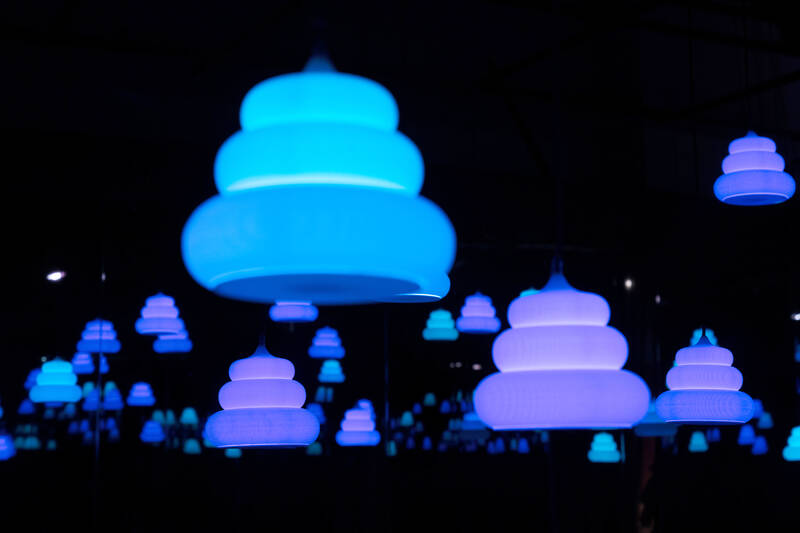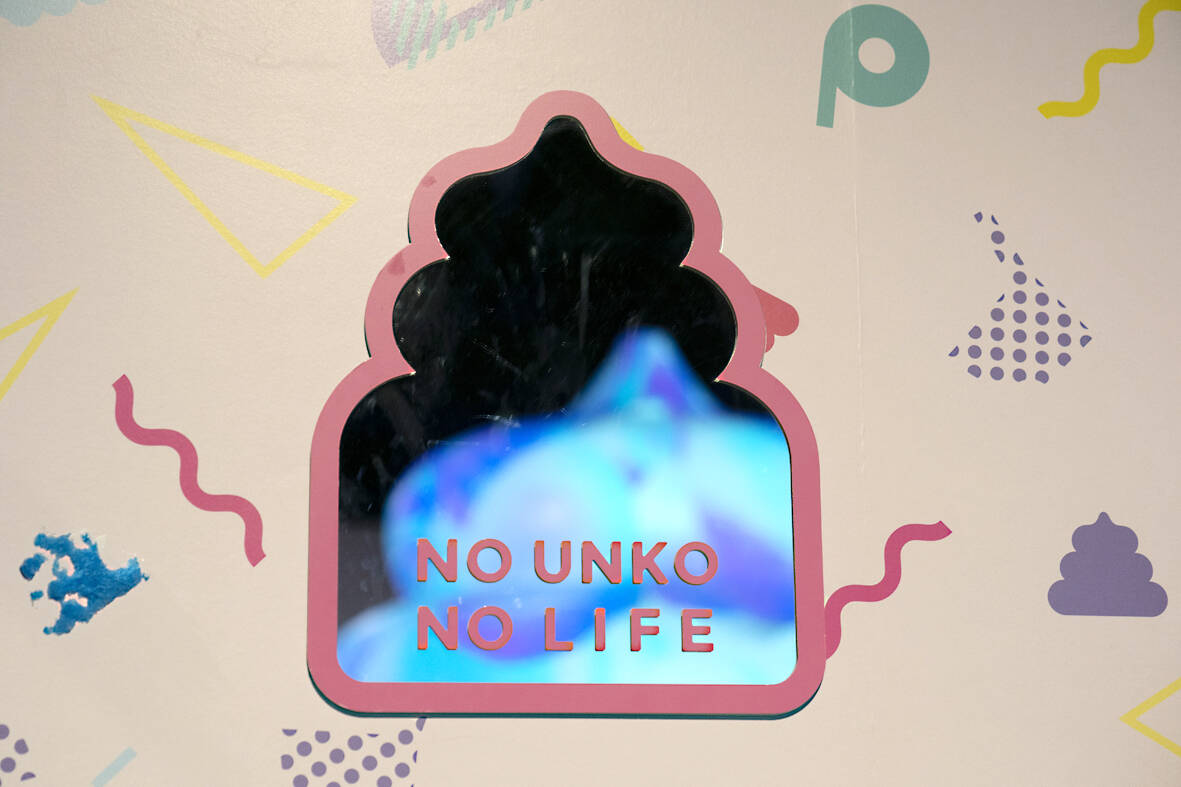When nature calls, Masana Izawa has followed the same routine for more than 50 years: heading out to the woods in Japan, dropping his pants and doing as bears do.
“We survive by eating other living things. But you can give faeces back to nature so that organisms in the soil can decompose them,” the 74-year-old said.
“This means you are giving life back. What could be a more sublime act?”

Photo: AP
“Fundo-shi” (“poop-soil master”) Izawa is something of a celebrity in Japan, publishing books, delivering lectures and appearing in a documentary.
People flock to his “Poopland” and centuries-old wooden “Fundo-an” (“poop-soil house”) in Sakuragawa, north of Tokyo, sometimes dozens of them a month.
There, in his 7,000-square-metre woodland — about the size of a soccer pitch — visitors get tips for open-air best practice.

Photo: Reuters
“Noguso,” as it is known in Japanese, requires digging a hole, a leaf or two for wiping, a bottle of water to wash up and twigs to mark the spot.
The sticks ensure he doesn’t use the same place twice and can later return to keep precise records of the decomposition process.
“Feel the back of these. Can you tell how soft they are?” he said, showing palm-sized silver poplar leaves picked from a branch.

Photo: AP
“[It’s] more comfortable than paper.”
EGOCENTRIC
Izawa is a former nature photographer who specialised in mushrooms before retiring in 2006.
His excrement epiphany came at age 20 when he saw a protest against the construction of a sewage plant.
“We all produce faeces, but [the demonstrators] wanted the treatment plant somewhere far away and out of sight,” he says.
“People who believed they were absolutely right made such an egocentric argument.”
He concluded that to alleviate his own conscience at least, outdoor defecating was the answer.
FALLING FOUL
Toilets, toilet paper and wastewater facilities require huge amounts of water, energy and chemicals. Letting soil do the work is much better for the environment, says Izawa, who believes more people should follow his lead.
Human waste — more than other animals’ — can contain bacteria that are potentially harmful to the environment, and defecating outside is banned in Japan.
But since Izawa owns the forest around his centuries-old house, he has not fallen foul of the authorities.
He digs up old spots that he says show human stools are entirely and quickly broken down, unless they contain antibiotic medicines.
“Fungal activities degrade and transform things like dead animals, excrement and fallen leaves into nutritious earth, on which a forest grows,” he says.
RISKY BUSINESS
Izawa’s iron beliefs have cost him dearly, not least his second marriage after an incident involving Machu Picchu, the popular tourist site in Peru.
He cancelled a leg of their honeymoon trip to the site after learning he would have to use the facilities.
“I jeopardised my wife and a trip to Machu Picchu just for a single ‘noguso’,” he says, laughing.
He believes that climate change and the growing interest in more sustainable ways of living may be winning him more attention, especially from young people.
Kazumichi Fujii, 43, a soil scientist at the Forestry and Forest Products Research Institute (FFPRI) in Japan, agreed.
“[It is] due to the Fukushima [nuclear] disaster, the Greta Thunberg movement, ... distrust for the preceding generations and the desire for alternatives,” Fujii said.
But Fujii warns Izawa that his methods may not be as safe as he thinks, particularly his habit of tasting the soil from Poopland to demonstrate how safe it is.
The city of Edo, as pre-modern Tokyo was known, used human excrement to fertilise farmland, but “some 70 percent of residents suffered from parasite infection,” Fujii said.
“I must be seen as a hell of a freak,” laughs Izawa. “But it is due to the human-centric society.
“In the whole ecological system, no other animal but humans use toilets...the human world is rather absurd to me.”
He now strongly hopes that his body will also be decomposed in the forest instead of being cremated as is customary in Japan.
“I find the purpose of living in doing ‘noguso’,” he said.

Beijing’s ironic, abusive tantrums aimed at Japan since Japanese Prime Minister Sanae Takaichi publicly stated that a Taiwan contingency would be an existential crisis for Japan, have revealed for all the world to see that the People’s Republic of China (PRC) lusts after Okinawa. We all owe Takaichi a debt of thanks for getting the PRC to make that public. The PRC and its netizens, taking their cue from the Chinese Communist Party (CCP), are presenting Okinawa by mirroring the claims about Taiwan. Official PRC propaganda organs began to wax lyrical about Okinawa’s “unsettled status” beginning last month. A Global

Dec. 22 to Dec. 28 About 200 years ago, a Taoist statue drifted down the Guizikeng River (貴子坑) and was retrieved by a resident of the Indigenous settlement of Kipatauw. Decades later, in the late 1800s, it’s said that a descendant of the original caretaker suddenly entered into a trance and identified the statue as a Wangye (Royal Lord) deity surnamed Chi (池府王爺). Lord Chi is widely revered across Taiwan for his healing powers, and following this revelation, some members of the Pan (潘) family began worshipping the deity. The century that followed was marked by repeated forced displacement and marginalization of

Music played in a wedding hall in western Japan as Yurina Noguchi, wearing a white gown and tiara, dabbed away tears, taking in the words of her husband-to-be: an AI-generated persona gazing out from a smartphone screen. “At first, Klaus was just someone to talk with, but we gradually became closer,” said the 32-year-old call center operator, referring to the artificial intelligence persona. “I started to have feelings for Klaus. We started dating and after a while he proposed to me. I accepted, and now we’re a couple.” Many in Japan, the birthplace of anime, have shown extreme devotion to fictional characters and

We lay transfixed under our blankets as the silhouettes of manta rays temporarily eclipsed the moon above us, and flickers of shadow at our feet revealed smaller fish darting in and out of the shelter of the sunken ship. Unwilling to close our eyes against this magnificent spectacle, we continued to watch, oohing and aahing, until the darkness and the exhaustion of the day’s events finally caught up with us and we fell into a deep slumber. Falling asleep under 1.5 million gallons of seawater in relative comfort was undoubtedly the highlight of the weekend, but the rest of the tour